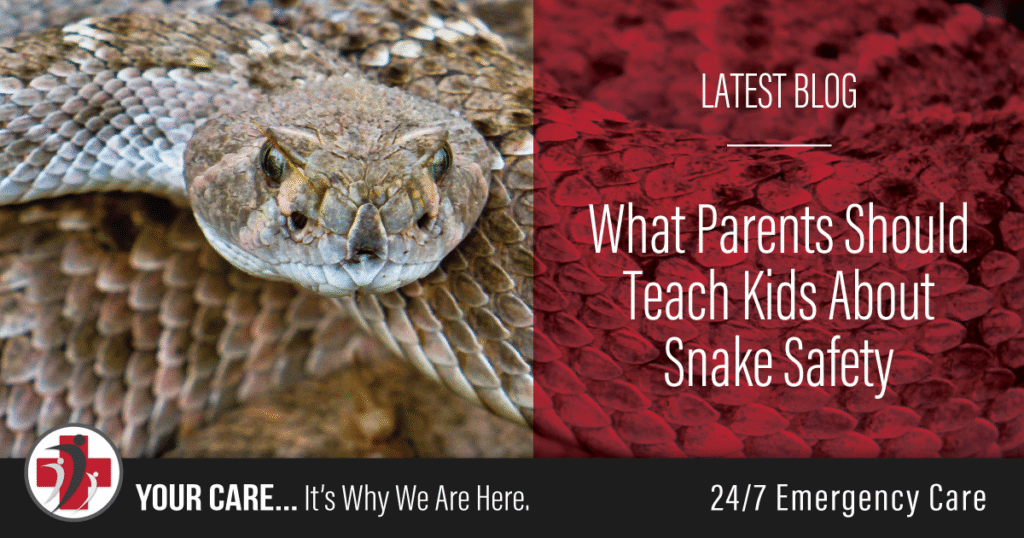Raising a family in Arizona certainly has its perks; beautiful weather, a wide range of outdoor activities, and breathtaking landscapes to name a few. But enjoying our outdoors means sharing the trails and spaces with venomous rattlesnakes. Snakebites are a real and dangerous threat. Arizona poison centers receive about 200 rattlesnake bite reports per year, and it’s estimated that an additional 100-150 unreported rattlesnake bites occur. The vast majority of these happen during the months of April through October, meaning prime hiking season coincides with prime snake season. Because kids are curious and like to touch things, and because snake bites are more serious for children due to their smaller size, don’t forget to talk about rattlesnake safety this summer as you embark on outdoor adventures with kids. It’s never too early to start teaching children about snake safety in Arizona, and it’s important to review protocol often.
If you could use a refresher on the best tips to share with kids, we have a few to share.
-
Avoid hidey holes
It can be so fun to look under rocks and inside holes, but those are some of snakes’ favorite hiding places. A good rule of thumb is to never put your fingers, hands, or feet into areas you can’t see.
-
Floating branch? Think again
Swimming rattlesnakes can closely resemble sticks or branches in the water. Kids should be taught to never reach out and grab what’s floating by.
-
Stay with the pack
Kids often love to run ahead when walking or hiking, but it’s best practice for kids to stay with an adult who’s keeping a careful watch on the trail.
-
Learn the sound
Help kids be aware of what a rattlesnake might sound like in a variety of situations, and teach them to listen carefully while in snake-friendly environments.
-
Dead or alive?
It can be difficult to determine whether a snake is dead or alive, and it’s never smart to get close enough to a snake to poke or touch. Also, even a dead snake can be dangerous. The fangs of a dead snake can still contain, and inject, venom. Children should be taught to give all snakes a wide berth and tell an adult immediately upon seeing one.
Avoid hidey holes
It can be so fun to look under rocks and inside holes, but those are some of snakes’ favorite hiding places. A good rule of thumb is to never put your fingers, hands, or feet into areas you can’t see.
Floating branch? Think again
Swimming rattlesnakes can closely resemble sticks or branches in the water. Kids should be taught to never reach out and grab what’s floating by.
Stay with the pack
Kids often love to run ahead when walking or hiking, but it’s best practice for kids to stay with an adult who’s keeping a careful watch on the trail.
Learn the sound
Help kids be aware of what a rattlesnake might sound like in a variety of situations, and teach them to listen carefully while in snake-friendly environments.
Dead or alive?
It can be difficult to determine whether a snake is dead or alive, and it’s never smart to get close enough to a snake to poke or touch. Also, even a dead snake can be dangerous. The fangs of a dead snake can still contain, and inject, venom. Children should be taught to give all snakes a wide berth and tell an adult immediately upon seeing one.
While we’re on the topic of protecting loved ones from rattlesnake bites in Arizona, we can’t forget about the furrier members of the family. It’s recommended that dogs be kept on a 6-foot leash at all times, and that owners consider snake avoidance training. You can also ask your veterinarian about whether the rattlesnake vaccine is recommended for your pet. This vaccine is typically administered in a two-step schedule and can reduce the severity of a rattlesnake bite in a pet.
While rattlesnakes are a dangerous reality of living in Arizona, it’s still possible to feel confident in being able allow children to enjoy the outdoors safely. Let snake safety be a regular topic of conversation in your family to help adults and kids remain aware, cautious, and healthy.

